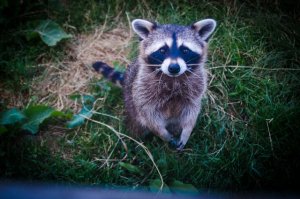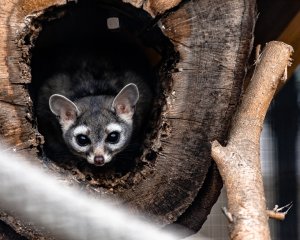Raccoons are generally dangerous to humans and pets. With their strong defensive features, they can be aggressive, bite or scratch. Not only may they attack, but the diseases they often carry can be dangerous as well.
Some raccoons may be friendly and curious, while others will run off instead of attacking. However, it is best to be safe and stay away from raccoons.
Table of Contents
Are Raccoons Scared of Humans?
Raccoons are typically scared of humans. Under normal circumstances, they will run away at the sight or sound of any human rather than attack.
Bolder raccoons may approach you, usually because another human has fed them before.
However, they still may bite or scratch in self-defense.
Why & When Do Raccoons Attack Humans?
Raccoons attack humans if:
- they are cornered
- protecting their babies
- when they carry a disease
1. When Raccoons Are Cornered
Most attacks occur when trying to catch, tame, or kill the raccoon.
2. When They Carry a Disease
Raccoons with diseases, especially rabies, are more prone to attack humans without being provoked.
Raccoons are one of the top carriers of rabies. Even if a rabid raccoon doesn’t attack, you could still get rabies or experience other health issues. Coming into contact with any bodily fluids or even breathing the same air as a rabid raccoon can transmit the disease.

These 7 signs point toward a rabid raccoon:
- Discharge from its eyes and mouth
- Staggering or trouble walking
- Strange and repetitive high-pitched noises
- Wandering
- Wet and matted fur
- Self-mutilation
- Lack of reaction to noise or movement
Moreover, touching their droppings might be dangerous because of raccoon roundworms, another common disease among raccoons.
3. When Protecting Their Babies
Female raccoons are more likely to attack humans when protecting their young.
If you attempt to approach a raccoon den with baby raccoons, the mother can and will become aggressive.
It is a good idea to contact a wildlife control or pest control professional for raccoon removal rather than do it yourself.
Never approach a raccoon, even if it seems friendly.
Will Raccoons Attack Pets?
Since pets are more likely to engage with raccoons, they are attacked more frequently than humans.
The raccoon will become defensive and possibly injure bigger animals, including larger dogs. They can also kill smaller pets such as cats, small dogs, and rabbits.
Remember that raccoons prey on small animals for food at night. This is why you shouldn’t leave your pets outside at night. You also shouldn’t leave any cat food or dog food around since it may lure raccoons into your yard or house.
What to Do if a Raccoon Attacks or Bites You?
In an attack, raccoons will use their sharp claws and teeth. They will also arch their back and growl as a warning before attacking.
If a raccoon attacks you, you should seek medical attention immediately.
People often get stitches for the deep cuts caused by a raccoon. Moreover, raccoon attacks can lead to infections and diseases such as rabies, leptospirosis, and salmonella.
What to Do if a Racoon Attacks or Bites Your Pet?
In most cases, raccoons will run off when they hear another animal. However, if a raccoon attacks your pet, grab a large object such as a shovel or bat and separate the two animals.
Try not to hurt the raccoon intentionally; focus on trying to remove it from your pet. If you hurt it, it may attack you.
Finally, if a raccoon attacks your pet, get immediate medical attention to make sure you both stay disease-free.
What to Do if You See a Raccoon?

The best thing to do if you see a raccoon is to leave it alone.
Usually, when a raccoon encounters a human, it will freeze and stare, waiting to see what the person will do. It is best to break eye contact and carefully walk away.
If the raccoon approaches, it is advised to clap or yell loudly to scare it off.
Keep in mind that raccoons attack when they feel cornered. Therefore, they are less likely to attack if there is room to escape.
Also, always avoid trying to feed, touch or pet a raccoon; it may bite you or scratch you in the process.
Wild animals are unpredictable, so it is best to stay cautious, avoid any contact, and contact professionals for removal from your property.

